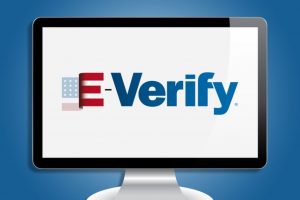
U.S. Rep. Ken Calvert (R-CA), joined by more than a dozen Republican U.S. House members, on Jan. 4 introduced legislation that would require American employers utilize the E-Verify system to confirm that all future hires are eligible to work in the United States.
“By requiring the use of E-Verify, we can send a strong and clear message that people looking to come to America to improve their economic outlook must do so legally if they want to work here,” Rep. Calvert said.
The Legal Workforce Act, H.R. 250, would amend the Immigration and Nationality Act to make mandatory and permanent requirements relating to use of an electronic employment eligibility verification system, among other purposes, according to the congressional record.
“Fixing our broken immigration system is long overdue and requires solutions like the Legal Workforce Act,” said Rep. Calvert. “We want and need immigrants to come to our nation to contribute to our success, but we must also remain a sovereign nation governed by the rule of law.”
Sixteen Republicans joined Rep. Calvert in supporting H.R. 250, including U.S. Reps. Doug Collins (R-GA) and Tom Cole (R-OK).
Specifically, H.R. 250 would repeal the current paper-based I-9 system and replace it with E-Verify, which is operated by U.S. Citizenship and Immigration Services to check the Social Security numbers of newly hired employees against the records kept by the U.S. Social Security Administration and U.S. Department of Homeland Security to ensure work eligibility, according to a summary of the bill provided by Rep. Calvert’s office.
In fact, Rep. Calvert in 1996 authored the law that created the E-Verify program and he has worked since then to expand the system and make it mandatory, his staff said.
Among other provisions in H.R. 250, mandatory E-Verify participation for new hires would be phased in over six-month increments.
For instance, if enacted, the bill would require businesses with more than 10,000 employees to use E-Verify within six months.
Similarly, within 12 months of the bill’s enactment, businesses with 500 to 9,999 employees would be required to use E-Verify; 18 months after enactment, businesses having 20 to 499 employees would be required to start using E-Verify; and 24 months after enactment, businesses with 1 to 19 employees would have to use the system, according to the congressman’s summary.
H.R. 250 also would require that employees performing “agricultural labor or services” would need an E-Verify check within 30 months of the date of the bill’s enactment.
H.R. 250 also would bolster penalties on employers who knowingly hired illegal immigrants, according to the summary.
The bill has been referred to the House Judiciary Committee, the House Ways and Means Committee, and the House Education and Labor Committee for consideration.



